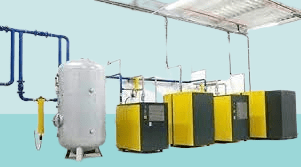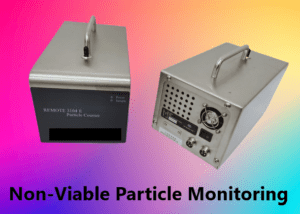Explore the critical role of compressed air qualification in pharmaceutical industries. Discover how this vital process safeguards product integrity, meets regulatory standards, and prioritizes patient safety. Learn how compressed air qualification enhances operational efficiency, reduces costs, and upholds stringent quality assurance practices in pharmaceutical manufacturing.
In the pharmaceutical industry, maintaining product integrity and ensuring patient safety are paramount. Among the critical considerations in pharmaceutical manufacturing processes is the qualification of compressed air systems. Compressed air serves as a vital utility in various applications, making it essential to validate its quality and reliability. This article highlights the importance of compressed air qualification in pharmaceutical plants, emphasizing its role in safeguarding product quality and meeting regulatory standards.

System Description:
In pharmaceutical plants, the compressed air system serves as a critical utility, providing the necessary air supply for numerous manufacturing operations. This system consists of components such as compressors, air receivers, air dryers, filtration units, and distribution pipelines. Through careful design, strict qualification processes, and continuous monitoring, pharmaceutical plants ensure that the compressed air delivered to critical processes meets stringent quality standards, minimizing the risk of product contamination and ensuring the integrity of pharmaceutical products.
The Compressed Air Qualification:
PQ test shall be done for 3 consecutive days initially and the sample shall be taken from the user points as per below protocol:
- OVERVIEW:
- This report defines the results of periodic performance qualification of compressed air generation & distribution systems.
- Objective
- The purpose of this report is to compile the results of PPQ as per protocol to demonstrate and assure that:
- The unit meets all pre-defined specifications.
- The unit meets all pre-defined particulate and microbial specifications.
- TEAM:
- List of the persons involved in completing this study with defined responsibilities as per protocol.
Tests for Oil Mist:
- Set up the assembly for oil mist determination at the outlet of the Air receiver.
- Set the flow rate of compressed air to 1000 ml/minute
- Pass the compressed air through the Gastec oil mist determination tube for 20 minutes (to be
- confirmed for determining oil level up to 0.01 mg / m3).
- Observe the tube immediately for the color change from pink to blue. (Please confirm whether
- color change indicates oil content is below 0.01 mg / m3)
- Perform the test at all the specified locations for three days and the results are attached.
Acceptance criteria:
- Oil contents should not be NMT 0.1 mg/ m3.
Tests for Moisture Content of Air:
- Set up the assembly for the water vapor detector tube (With absorbent filters and suitable supports for the magnesium perchlorate indicator).
- Set the flow rate of compressed air to 100 ml/minute.
- Pass the compressed air through the tube having the absorbent.
- Read the valve corresponding to the length of the coloured layer or the intensity of the color on the graduated scale.
- Record the observations in the observation table.
- Perform the test on all specified locations for three consecutive days and results attached as Annexure-04
- Alternatively, measure the dew point of the compressed air at the user points using a calibrated Dew Point Meter.
Acceptance criteria:
- The water vapor should not be more than 67 ppm.
- The Dew Point should be ≤ -40°C.
Non- Viable particulate Count Test
- Non-viable particulate counts are performed by the Particle counter which has Isokinetic Probe.
- Ensure that the Particle counter is in calibrated status.
- The Non-viable particle counter shall be transferred to the in front of the Sampling point and the valve of the sampling point shall be opened and placed the sampling probe towards the sampling point with a distance of two inches.
- The particle counter shall be operated as per the respective SOP.
- One Cubic meter of air shall be taken and measured the 0.5 µm and 5.0µm particles and the cumulative counts shall be recorded.
- Perform the test at an identified location for consecutive 03 days and the results are attached in Annexure-05.
Acceptance Criteria:
| WHO Grades | Maximum permitted no of particles / m3 of air | |
| ≥ 0.5 µm | ≥ 5.0 µm | |
| B | 3,520 | 29 |
| C | 352,000 | 2,900 |
Total Viable Particle Count:
- Assemble all the sampling accessories and connect the outlet of the compressed air valve to the pressure regulator of the compressed gas monitoring system using a sterile PU tube.
- Remove the sieve by rotating the conical assembly and place the prefilled media cassette in the slot provided.
- Remove the media cassette cover and place the sieve back.
- Open the valve of the compressed air and start the compressed air sampler.
- After completion of sampling close the Compressed air valve and remove the sieve
- Aseptically place the cover back on the cassette and take out the cassette.
Note: In case of more than one sample, sanitize the sieve using 70% filtered IPA
- After sampling, bring the cassette back to the microbiology lab for incubation.
- Incubate the cassette at 20-25°C for 72 hrs. and further at 30-35°C for 48 hrs
- Perform the test at identified location for consecutive 03 days and results attached in Annexure-06.
Acceptance criteria:
The viable particulate count should be as per the Cleanroom classification.
- PERFORMED DURING PERIODIC PERFORMANCE QUALIFICATION:
- Training was imparted to execute the activity and is attached.
- Non Viable Particle count was performed and the results are attached.
- Microbial test was performed. The result is recorded.
- Oil / gas contents were performed. Results are attached with
| Sampling Point | Sampling Location | Parameters | 14/04/2022 | Comply Yes/No | Aceptance Criteria |
| Observation | |||||
| Oil Mist | No Colour Change Observed in Tube | Yes | NMT 0.1 mg/m³ | ||
| Moisture Content | No Colour Change Observed in Tube | Yes | NMT 67 PPM | ||
| Carbon Dioxide | No Colour Change Observed in Tube | Yes | NMT 500 PPM | ||
| Carbon Monoxide | No Colour Change Observed in Tube | Yes | NMT 5 PPM | ||
| NO + NO2 | No Colour Change Observed in Tube | Yes | NMT 2 PPM | ||
| Dew Point | -24.65 ° C | Yes | ≤-20° C | ||
| Sulphur Dioxide | No Colour Change Observed in Tube | Yes | NMT 1 PPM |
Example of the Test Certificate:
| Test Certificate | |||||||
| Customer | Flair Pharma | Date of Test | |||||
| Address | Type of test | Determination of Compressed Air Quality | |||||
| Area of Test | Utility | Sampling Location | |||||
| INSTRUMENT DETAILS | |||||||
| Instrument Name (1) | Rotameter | Instrument Name (3) | Pressure Gauge | ||||
| Make / Model | Make / Model | ||||||
| Instrument ID No. | Instrument ID No. | ||||||
| Calibrated on | Calibrated on | ||||||
| Calibration Due on | Calibration Due on | ||||||
| Instrument Name (2) | Digital Stopwatch | Instrument Name (4) | Dew Point Meter | ||||
| Make / Model | Make / Model | ||||||
| Instrument ID No. | Instrument ID No. | ||||||
| Calibrated on | Calibrated on | ||||||
| Calibration Due on | Calibration Due on | ||||||
| OBTAINED TEST RESULTS | |||||||
| Sample Point ID | Parameter | Type of Gas / Oil Content | Tube No. | Colour Detection | Color Detection | Result | Test Status |
| Color Detection | |||||||
| Gas / Oil Content | Oil Mist | 109AD | Pale Vermilion to Pale Blue | 0.1 mg/m³ | No Colour Observed | Pass | |
| Moisture Content | 6A | Yellow to Green | 67 PPM v/v | No Colour Observed | Pass | ||
| Carbon Monoxide | 1LC | White to Pale Pink | 5 PPM v/v | No Colour Observed | Pass | ||
| Carbon Dioxide | 2LC | Pale Red to Orange | 500 PPM v/v | No Colour Observed | Pass | ||
| Nitogen Oxides | 11L | White to Yellowish Orange | 2 PPM v/v | No Colour Observed | Pass | ||
| Sulphur Dioxide | 5LC | Bluish Purple to White | NMT 1 PPM v/v | No Colour Observed | Pass | ||
| Dew Point | ≤-20° C | -24.65 ° C | Pass | ||||
| Test Certificate | |||||
| Customer | Flair Pharma | Date of Test | |||
| Address | Type of Test | Particle Count Level at “Compressed Air” | |||
| INSTRUMENT DETAILS | |||||
| Instrument Used | PARTICLE COUNTER | ||||
| Make | |||||
| Model / Serial No. | |||||
| Calibration on | |||||
| Calibrated Due on | |||||
| TEST DETAILS | |||||
| Flow Rate | 100.0 LPM | Sampling Time | 10 Min. | ||
| Sampling Volume | 1000.0 L | ||||
OBTAINED TEST RESULTS
| Area of Test | Sampling ID | Sampling Location | Sample | No. of Particles ≥ 0.5µm/m³ | No. of Particles ≥ 5 µm/m³ |
| Maximum allowable concentrations (Particles/m3 of air) for particles equal to or larger than the considered sizes below | |||||
| 0.5 µm | 5 µm | ||||
| 3520 | 20 | ||||


